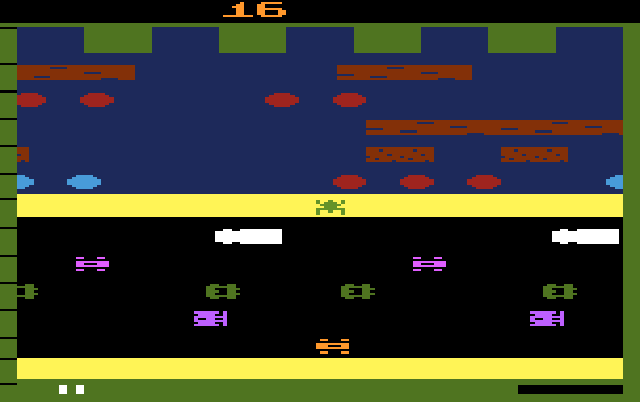
Even though I did, at one point, own an Atari 2600, there's something I'm just now realizing about the games on that system: they're all running on the same chassis. There's a comfortable familiarity to the gameplay structures, and if you get it, you've unlocked a world of intense, competitive gameplay. The only difference, then, is to choose your flavour of game; that is, what appeals to you on a fundamental level?
The formula with which Atari 2600 games (and by extension, obviously, their arcade forebears which set this template) play is pretty simple, and it's one I brought up in my SeaQuest review: objective + obstacle, multiplied by intensity after each level = video game. It's the formula I saw in SeaQuest, and it's the exact same formula present in Frogger. You know what? It works.
Now, there's one big difference between SeaQuest and Frogger (besides obvious design differences that I'll get to). Whereas SeaQuest is a bit of a relic, stuck forever in the annals of history, Frogger went on to become a worldwide phenomenon, a franchise that has spanned every console generation. Now, most of that goodwill comes from his arcade exploits, but even the PS2 game Frogger: The Great Quest (which was a lackluster Super Mario 64 clone) was one of the best-selling PS2 games of all time. There's a love of this game that transcends all boundaries (indeed, this game was recommended to me by a colleague of mine at the high school, a fortysomething math teacher), and that has to do with a simplicity, a purity of gameplay, and nowhere is that found more than in this original game.
If you've ever tried to describe a modern, HD game to someone who has barely played a video game before, it could be quite the daunting task. How in god's name could I begin to describe what playing Fallout 3 is like to my dad, for example? Frogger is easily understood, and that's its greatest quality. It's a setup that almost any human being would get: there's a frog, trapped on the wrong side of traffic, and you need to get him home. And that's all there is to it. Now, obviously, I think there are some pretty overt environmental messages going on here, but I'll spare the eco-critique of Frogger for now. Suffice to say, if you can't see how a game where a frog is impeded from living life because of humans, traffic, and the industrial complex is perhaps making a statement about those things, then you might be reading the wrong website. The game doesn't hit you over the head with it – I don't think Atari games were capable of hitting you over the head with anything except difficulty – but the repeated "splats" of frogs on the pavement send that message far more clearly than an overt screed ever could.
There's such a beautiful simplicity to the gameplay that it feels like nothing could ever have been out of place. There's no buttons to press, no complicated moves. All you can do is move Frogger in four directions, and that's it. It's unfortunate that simplicity is looked down upon these days (outside of motion control games), as it makes Frogger incredibly easy to pick up, play, and enjoy. It also makes interacting with the world feel as natural as it could be. In other words, there's nothing standing between the player and the objective except for the elements of the game that the designers throw at you, and that's something that can't be said of many games.
Getting Frogger home is an easy task then, but it's also never easy. I mean, I basically never made it past the second level, and that's because of the "die/retry/learn" aspect of game development from this era that has essentially been eradicated (outside of arcades). And let's be fair, there can obviously be more to games than this. But that purity is so refreshing and ultimately so intoxicating that Frogger should continue to keep its hallowed status. Just never, ever play Frogger: The Great Quest. Seriously. Never.
Thanks for the suggestion, Darla! Got a game you want me to play? Request now!
Join the conversation
[…] 2600) – Neil Resident Evil 4 (Gamecube) – Neil Chrono Trigger (SNES) – Eric Frogger (Atari 2600) – Darla Blast Corps (N64) – Nick ActRaiser (SNES) – Peter Illusion […]